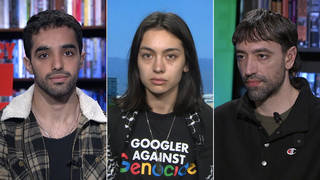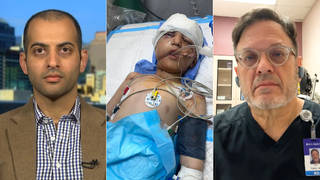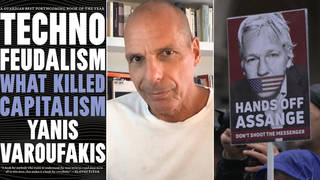
Related
Suspected members of the Lord’s Resistance Army in Uganda massacred more than 200 civilians living in a refugee camp. We go to Uganda to hear from a coordinator with Doctors Without Borders which is treating the wounded and we speak with a researcher on Africa for Human Rights Watch. [includes transcript]
Over the weekend in Uganda suspected members of the Lord’s Resistance Army massacred more than 200 civilians living in a refugee camp. According to an eyewitness report many of those killed were forced into grass-thatched houses that were then set ablaze. Others trying to flee were shot, bludgeoned or hacked to death by rebels wielding clubs, machetes and AK-47s.
The attack comes barely three weeks after rebels massacred around 50 people in a nearby camp. About 5,000 people were left homeless by the most recent massacre. Since the Lord’s Resistance Army took up arms against the Ugandan government in 1988 about 1.2 million civilians in northern Uganda have been displaced from their homes.
Uganda’s President, Yoweri Museveni, issued a statement blaming the incident on weaknesses within the command structure of his army. He said a local army commander had allowed a loosely guarded, unofficial Internally Displaced Persons camp to be set up in the area. Museveni disputed the death toll, saying only 84 people had died. But the Catholic Church, which has a presence in the area, said some 213 people were killed. The attack is being called the most devastating on civilians in northern Uganda in nearly a decade.
- Tony Tate, researcher for Human Rights Watch on children’s rights issues and Africa. He traveled last year to Uganda.
- Carla Martinez, project coordinator of Doctors Without Borders in Lira, Uganda. The group has been treating the wounded from the recent massacres.
Transcript
AMY GOODMAN: Tony Tate joins us in our studio, researcher for Human Rights Watch on children’s rights issue and Africa. He was in Africa — was in Uganda months ago. Carla Martinez is us with, who is the project coordinator of Doctors Without Borders in Lira, Uganda. The group has been treating the wounded from the recent massacres. We’re going to go to Carla Martinez first. Can you describe the condition of the people that Doctors Without Borders is dealing with now?
CARLA MARTINEZ: Good morning. It was here, in Lira. The situation at the hospital is very bad. 66 people arrived very badly injured to the hospital with terrible burns and machete wounds and gunshot wounds on Sunday morning. A team of Doctors Without Borders with was taking care of them, doing dressing, and providing them medical care.
AMY GOODMAN: And what is your estimate of how many people died?
CARLA MARTINEZ: According to people that were at the camps, about 200 people died. Somebody went there and counted 200 people. We don’t know how many people died inside the huts that were completely burned.
AMY GOODMAN: Who did they say did it?
CARLA MARTINEZ: I don’t know who did it because we were not there. We were just at the hospital and receiving the patients that were so badly injured that arrived.
AMY GOODMAN: And men, women, children, the victims?
CARLA MARTINEZ: Yes. Yes.
AMY GOODMAN: And how does this massacre compare to what happened, which got almost no attention earlier this month?
CARLA MARTINEZ: Yes. There was another one two weeks and half weeks ago in another camp, also in Northern Lira, and at that time about 50 or 70 people died on the spot, and also we received another 50 people very badly injured at the same time from the one from last weekend.
AMY GOODMAN: We’re also joined in the studio by Tony Tate of Human Rights Watch. Can you talk about why you believe it’s the Lord’s Resistance Army who committed this massacre?
TONY TATE: Initial reports that have come in from partners of ours in the field have suggested that it is the Lord’s Resistance Army who is responsible for this massacre of over 200 civilians at the internally displaced persons’ camp. We have not yet conducted investigations as Human Rights Watch, but initial reports suggest that the Lord’s Resistance Army is responsible for this attack.
AMY GOODMAN: Who is the Lord’s Resistance Army?
TONY TATE: They’re a resistance army that was formed in 1988 ostensibly to overthrow Museveni who is the president of Uganda, and for 18 years have fought the Ugandan government and the Ugandan army in a civil war that has terrorized the civilians in the north of the country. This war has principally been fought against civilians, killing, abducting, and attacking men, women and especially children who are principally abducted by the Lord’s Resistance Army, pressed into service, and made to fight for them.
AMY GOODMAN: And how is the Ugandan government dealing with them?
TONY TATE: The Ugandan government has continued to fight the LRA, both in northern Uganda and, since 2002, in southern Sudan. The Ugandan government has also forcefully displaced the civilians in the north. There are presently over 1,200,000 civilians who are displaced in the north of Uganda, forced to live in camps, with limited access to fields and schooling opportunities. They received limited humanitarian assistance. It is not an easy situation for these civilians. And it is in these same camps where the Lord’s Resistance Army attacks, much as we saw over the weekend, killing civilians and abducting new members into their forces.
AMY GOODMAN: How do the kids get recruited into the LRA?
TONY TATE: Principally in these raids, conducted by the LRA, in the evenings. Children are often picked up, going to and from school, and also at the camps at night. The LRA will move in a military operation, attacking homes, taking children out of their homes, sometimes killing the parents in front of the children, in order to explain or to show to the children that they no longer have anything to return to, and so they should continue to fight with the LRA. They are tied together and taken away from the camps in groups of 10 and 20, sometimes as many as 40 and 50, beaten, tortured, sometimes made to kill other recruits to show their loyalty and bravery, given limited arms training, and then sent to the front lines.
AMY GOODMAN: What is the relationship between Museveni, the president of Uganda, and the United States?
TONY TATE: Museveni has long been a darling of the international donor community, and of the United States in particular, beginning back with the Clinton administration. You may remember, Amy, that Uganda was shown as one of the new leaders of Africa to distance this new leader from former dictators. He has been in power since 1986. Now, we’re talking his 18th year of reign. More presently, Uganda is a partner of United States in the war on terrorism. Uganda is one of the countries in the “coalition of the willing.” Uganda receives millions of dollars of assistance from the United States every year, as well as limited military assistance.
AMY GOODMAN: “Coalition of the willing,” meaning one of the countries that has supported the U.S. invasion of Iraq?
TONY TATE: That’s correct, and because of this support, the United States has been less than critical of Ugandan policies, both in neighboring Congo, but also in the war in the north.
AMY GOODMAN: Carla Martinez, in Lira, Uganda, where you are treating the victims of the massacre, what can people do on the outside, do you think, to help?
CARLA MARTINEZ: Well, there are several humanitarian organizations working here, but unfortunately we have some security constraints. People are living in camps outside of town where the humanitarian assistance cannot reach them because it is dangerous for our teams to go there, and there is not enough protection, in order for our teams to reach these camps. So a lot of times people living in these camps have no access to food, water, and health care. It’s difficult. These people are completely without humanitarian assistance.
AMY GOODMAN: What is Human Rights Watch recommending, Tony Tate?
TONY TATE: Well, as any good human rights NGO, we have several recommendations, both for the Ugandan government and the LRA. At the first stage, to continue to protect civilians. We have asked the LRA to stop abducting children, and the Ugandan government to offer further protection for civilians displaced in the north. In the sort-of medium term, we have asked the secretary general to appoint a special envoy who would specifically look at questions, in the north, of security, and the abduction of civilians, and further to begin a process of negotiation, bringing the two parties together. Since 18 years of fighting, we have seen no resolution in the war in the north, and we have supported steps now that would call for dialogue and an end to the fighting through peaceful resolution of the two parties; and we believe that this needs to be done by the United Nations or another third party, who can influence both the Ugandan government and the Lord’s Resistance Army to come to the negotiating table.
AMY GOODMAN: And Carla Martinez, from where you are, right near the massacre site… In fact, how far are you from it?
CARLA MARTINEZ: It’s 10 or 15 minutes.
AMY GOODMAN: Are you fearful that another massacre will be taking place, as one did just weeks ago?
CARLA MARTINEZ: Yes. People are very scared about it. In between the two attacks, there was a two weeks and a half period of relative calm, where everyday, small incidents happened, where one person is killed while they are looking for food or looking for water, but not such a big attack. After this second attack, in such a short period of time, people are definitely scared that something could happen. The president was today visiting the wounded people at the hospital and visited the place where the attack happened with a lot of military protection. So people are hopeful that maybe this military could protect the area. But people are really scared.
AMY GOODMAN: Well, I want to thank you both for being with us. I want to thank Tony Tate of Human Rights Watch, and Carla Martinez in Lira, Uganda.












Media Options